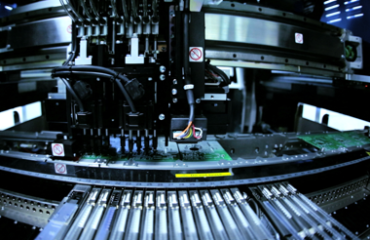![capgemini-smart-factories[1]](https://trylene.com/wp-content/uploads/2017/05/capgemini-smart-factories1-420x280_c.jpg)
According to the survey research, manufacturers expect their investments in smart factories will drive a 27% increase in manufacturing efficiency, over the next five years, which would add $500 billion to the global economy.
Whether described as Industrie 4.0, Industrial IoT or a ‘Digital Industrial Revolution’, the term “smart factory” is used by Capgemini to cover technologies such as Artificial Intelligence, Advanced Robotics, IoT, and Big Data Analytics, in order to increase productivity.
Smart factory features include, they say, collaborative robots, workers using augmented reality components] and machines that send alerts when they need maintenance.
Sectors, such as aerospace and defence, industrial manufacturing and automotive, where people work alongside intelligent machines, are expected to be the leaders in this area.
Headline findings included manufacturers expecting that 21% of their plants will be smart factories by the end of 2022, and 67% of industrial manufacturing and 62% of aerospace and defence organisations have smart factory initiatives.
 Little more than a third (37%) of life science and pharma companies, however, are reported as using such digital technology.
Little more than a third (37%) of life science and pharma companies, however, are reported as using such digital technology.
“This study makes it clear that we are now in the digital industrial revolution. The impact on overall efficiency will be profound,” said Jean-Pierre Petit, Global Head of Digital Manufacturing at Capgemini.
“The next few years will be critical as manufacturers step up their digital capabilities and accelerate their digital outcomes to maximize company benefits.”
UK smart factories
There are also figures for the UK specifically. The share of UK manufacturers, for example, having or planning smart factories is quoted as 70% (27% not in operation yet, 43% already ongoing).
In the next five years, according to the survey, 27% of UK manufacturers’ products will be produced in smart factories, and 48% of UK manufacturers will have a network of smart factories.
The global average, incidentally, is for 30% of products to be produced in smart factories, so we are behind that curve. The highest reported figure was for China, achieving 335 within five years.
Note, also, that only 8% of UK manufacturers are satisfied with their progress in smart projects, with 31% declaring themselves to be ‘struggling’.
Finally, 46% of UK manufacturers have invested more than $100m over the last five years.
Where are gains being made, in terms of digitisation of processes? Performance management leads the way, followed by inventory management and then maintenance management.
Use of IIoT is reported by 30% (global average 45%), advanced robotics by 26% (global average 40%) and Big Data by 23% (global average 44%).
Source: Capgemini Digital Transformation Institute, smart factory survey, February-March 2017.



![22jul15Rethink_Robotics_Baxter_Sawyer_2[1]](https://trylene.com/wp-content/uploads/2017/05/22jul15Rethink_Robotics_Baxter_Sawyer_21-370x240_c.jpg)